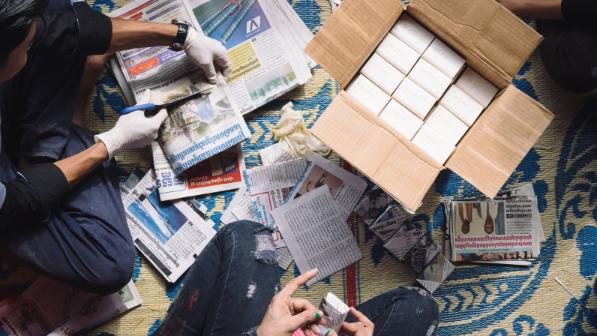
Responsibility
Delivered goes green and clean with Samir Lakhani from Eco-Soap Bank
The founder and CEO of humanitarian organization Eco-Soap Bank reveals how he had the idea to recycle leftover soap and donate it to schools, clinics and communities in developing countries.
The course of Samir Lakhani’s life changed in a single moment. As a result, the course of other people’s lives has changed, too – dramatically, and for the better.
It happened in 2014 when, as a student at the University of Pittsburgh, Lakhani spent time traveling abroad. He went to East Africa and India, and also visited Cambodia where, in one village, he was appalled to see a woman scrubbing her child down with harmful laundry detergent. It dawned on him that she wasn’t doing this by choice; it was because no one in the village had access to soap – it was too expensive – so this was the only alternative she had.
Lakhani also realized that this lack of soap was causing illness among the locals because everyone he met was suffering from some sort of ailment, from infections to diarrhea. “I’d identified the problem,” he says. “A simple bar of soap, which so many of us take for granted, would stop the spread of preventable disease, and improve the villagers’ lives.”
Later, back in his hotel, Lakhani identified the solution. A brand-new bar of soap had been left in his bathroom, but what had happened to the one he’d unwrapped only the day before? Had it simply been thrown away? “I suddenly knew where I could find a sustainable, environmentally sound supply of soap, rather than buying millions of new bars from a factory,” he says. “So, the next morning, I went from hotel to hotel, asking managers for their leftover soap. They must have thought I was out of my mind.”

This lightbulb moment led to the foundation of Eco-Soap Bank, a humanitarian and environmental non-profit organization that has since partnered with 1,220 hotels and 206 distribution partners in 10 countries to recycle over 1.4 million pounds of soap. To date, Eco-Soap Bank has turned old soap into more than 9 million new bars, which it has given to schools, health clinics and village communities in impoverished countries.
It’s a brilliant – and brilliantly simple – idea, based on one undeniable fact. “The global waste of soap is astronomical,” stresses Lakhani, a CNN Heroes Award winner who was named on last year’s Forbes 30 Under 30 social entrepreneur list. “It’s criminal to think of old soap winding up in landfill when it could be recycled and redistributed to people who desperately need it.”
When you approach hotels with the idea of recycling their leftover soap, what reaction do you get?
It’s not just hotels now. We also collect thousands of metric tons of virgin soap waste from soap factories and manufacturers every year. These stakeholders see this as an obvious win-win, because we take what is effectively trash from them and turn it into treasure that saves lives in less developed and impoverished countries.
How logistically difficult is the collection, recycling and delivery process?
We have the great fortune to employ 160 disadvantaged local women in 10 developing countries to collect the soap and then hand-recycle it. As the project expanded, we began parcel-shipping our soap; but now we regularly engage with global freight in order to send our recycled soap to, for example, disaster response settings and to refugee camps. Our soap is wrapped in upcycled newspaper, and the boxes we use to send it out are collected from the local area, and sealed using string taken from large bags of rice. Everything has been completely recycled, or upcycled.

Want it Delivered?
Why go looking for the latest logistics trends and business insights when you can have them delivered right to you?
How is the soap recycled?
We use a non-electrified, zero-carbon-emitting recycling press machine that is no heavier than 40 pounds, but can provide gainful employment to six to 10 women across the world. So, the work we do has a clear environmental benefit, a clear female empowerment benefit – and, of course, a massive public health impact.
You also provide communities with hygiene education. What impact does this have?
Hygiene is overlooked as a public health intervention, so we target schools in particular because we cannot afford to lose another generation through lack of hygiene awareness or poor hygiene habits. We work in partnership with hospitals and health clinics to ensure that outpatients leave not only with soap, but also with healthcare education delivered by a healthcare provider. We also employ an additional 41 women who serve as hygiene ambassadors. They go from household to household – when it is safe and appropriate to do so – providing soap at an affordable, subsidized cost so that they can support their own livelihoods, while giving some of the world’s most remote families essential hygiene education. — Tony Greenway
4 MILLION
The number of people who have received soap and hygiene education through Eco-Soap Bank
Published: June 2021
Image: Eco-Soap Bank





